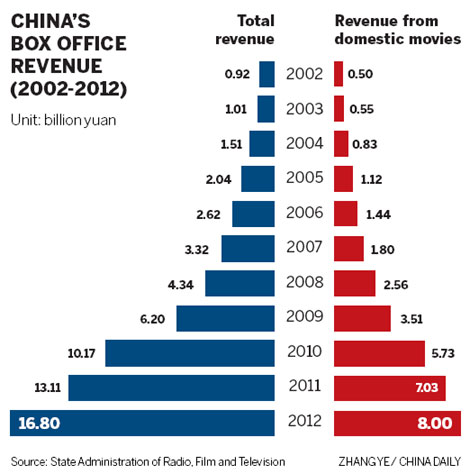Nation's movie ticket sales hit $2.69b last year
China's box office revenue last year reached 16.8 billion yuan ($2.69 billion), up almost 30 percent year-on-year, with domestic films contributing less than half of the figure for the first time in four years, the State Administration of Radio, Film and Television said.
In 2012, the number of films shown on the Chinese mainland reached 303, comprising 227 Chinese productions and 76 imported films.
Domestic movies generated 8 billion yuan in ticket sales, accounting for 47.6 percent of the total box office revenue, while foreign films represented 52.4 percent with ticket sales of 8.8 billion yuan.
The share of domestic movies in the total box office revenue had already declined from about 56 percent in 2010 to less than 54 percent in 2011, despite the revenue growth in absolute terms.
Ticket sales of Chinese films increased from 5.7 billion yuan in 2010 - when the total box office revenue exceeded 10 billion yuan for the first time ever - to 8 billion yuan last year.
Among the top 10 highest-grossing movies in 2012, only three were domestic pictures: Lost in Thailand, Painted Skin: The Resurrection and Jackie Chan's Chinese Zodiac 12.
Lost in Thailand - a low-budget comedy that premiered on Dec 12 and is scheduled to remain in theaters until mid-January - is the highest-grossing domestic film to date, with ticket sales of more than 1 billion yuan as of Jan 1.
The film - which cost about 30 million yuan to make, including marketing and promotion expenses - beat James Cameron's Titanic 3D, which grossed 939 million yuan in 2012 and was the highest-grossing film until being surpassed by Lost in Thailand.
"The fundamental reason for the fall of the domestic films' share of the box office revenue lies in their poor quality compared with imported films," said Huang Qunfei, general manager of Beijing New Film Association Co Ltd, one of the country's largest theater chains.
Huang added that another major reason behind the outcome was the signing of an agreement between China and the United States in February 2012, in which China agreed to expand the annual quota of imported films from 20 to 34, of which 14 will be in premium formats, such as 3D and Imax.
"The increase of imported films, especially in 3D and Imax formats, is going to have a continuous effect on China's film market at least in the next two to three years," said Liu Cuiping, research manager of EntGroup Consulting, a Beijing-based entertainment industry consultancy firm.
However, the current situation should not be seen in a negative way, as the big picture for China's film industry has been that of a booming business in recent years, which can be demonstrated by the increase in domestic films and the expansion of movie theaters, said Liu Hanwen, deputy director of the Film Institute Development Research Center at the State Administration of Radio, Film and Television.
Liu said that about 150 more domestic films were made in 2012 compared with the previous year, indicating that investors are optimistic.
The number of movie theaters climbed from 1,545 in 2008 to 3,293 as of September 2012, while the number of screens increased from 4,097 in 2008 to more than 12,000.
Speaking of the success of Lost in Thailand, Huang from the New Film Association said that a series of elements contributed to its warm reception, including the release date.
Liu from EntGroup said that the record set by the film might also bring about a boom of medium- and low-budget domestic productions this year and next year.
huangying@chinadaily.com.cn

(China Daily 01/04/2013 page13)








